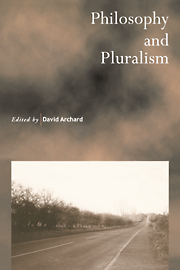Book contents
- Frontmatter
- Contents
- Notes on Contributors
- Introduction
- Philosophy in Different Cultural Contexts
- A Case for Philosophical Pluralism: The Problem of Intentionality
- William James, ‘A Certain Blindness’ and an Uncertain Pluralism
- Cultural Realism: the ancient philosophical background
- Religion and Pluralism
- A Single True Morality? The Challenge of Relativism
- Pluralism, Realism and Truth
- Value-Pluralism
- Moral Philosophy and its Anti-pluralist Bias
- Coping with the Many-Coloured Dome: Pluralism and Practical Reason
- Rawlsians, Pluralists, and Cosmopolitans
- Political Liberalism, Secular Republicanism: two answers to the challenges of pluralism
- ‘Race’ in Britain and the Politics of Difference
- Tragedy, Moral Conflict, and Liberalism
- References
Introduction
Published online by Cambridge University Press: 30 October 2009
- Frontmatter
- Contents
- Notes on Contributors
- Introduction
- Philosophy in Different Cultural Contexts
- A Case for Philosophical Pluralism: The Problem of Intentionality
- William James, ‘A Certain Blindness’ and an Uncertain Pluralism
- Cultural Realism: the ancient philosophical background
- Religion and Pluralism
- A Single True Morality? The Challenge of Relativism
- Pluralism, Realism and Truth
- Value-Pluralism
- Moral Philosophy and its Anti-pluralist Bias
- Coping with the Many-Coloured Dome: Pluralism and Practical Reason
- Rawlsians, Pluralists, and Cosmopolitans
- Political Liberalism, Secular Republicanism: two answers to the challenges of pluralism
- ‘Race’ in Britain and the Politics of Difference
- Tragedy, Moral Conflict, and Liberalism
- References
Summary
As befits a volume devoted to the topic of pluralism the contributing pieces collected here are varied. Their concern is with very different kinds of difference, and their conclusions range from an insistence that pluralism is both inevitable and desirable to a belief that it is unsustainable and perhaps remediable. The starting point for any discussion of pluralism is a recognition that we inhabit a world of differences. These differences are exhibited in moral outlooks, cultural identities, ways of life, religious beliefs, and even modes of philosophy. The mere fact of such differences is salient but unremarkable. What preoccupies philosophers is the question of the conclusions that are to be drawn from a proper recognition of this fact. And the central issue at dispute for philosophers is whether the fact of difference—plurality—licences a view—pluralism—that it is legitimate, rather than just inevitable, that such difference should persist.
It simplifies but does not necessarily exaggerate matters to suggest that philosophers are torn between two impulses. On the one hand, there is the conviction that the goal of philosophical argumentation is convergence upon a single agreed answer. Truth is one, and so too, it has been felt, is the good. Difference is a sign of failure, evidence that mistakes have been made somewhere by someone. To maintain otherwise is inconsistent with how one must understand the nature of truth or morality.
- Type
- Chapter
- Information
- Philosophy and Pluralism , pp. 1 - 6Publisher: Cambridge University PressPrint publication year: 1996
- 1
- Cited by

